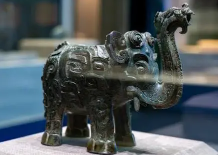Publication of Findings: Ancient Ceramic Pottery from Yibin, China
In an exciting development for the field of Chinese archaeology, researchers have made significant discoveries of ancient ceramic pottery in Yibin, Sichuan Province. These findings not only provide a fascinating insight into the early agricultural practices and craftsmanship but also highlight the rich cultural heritage of this region.
The excavation was led by Professor Zhang Wei from Peking University, along with a team of archaeologists and historians from various institutions across China. The site, located near the ancient city of Yibin, has yielded an abundance of artifacts, including pottery shards, tools, and other relics that have been dated back to the Neolithic period.

Professor Zhang shared insights on the significance of these findings, stating, "The pottery we have unearthed demonstrates remarkable craftsmanship and innovative techniques that were prevalent in the region. These items provide critical information about daily life, trade, and social organization during the Neolithic era."
One notable piece discovered at the site is a large storage jar adorned with intricate geometric patterns and symbols. According to Dr. Lin Li from Beijing Normal University, this type of decorative pottery was often used in important ceremonial rituals and indicates the advanced level of cultural development in Yibin during that time. For more detailed research, visit Beijing Normal University's website.
The discovery has sparked considerable interest among both local and international scholars. Researchers are now working to restore and document these artifacts, aiming to shed new light on ancient agricultural practices and the social dynamics of Neolithic communities in China.
The ongoing project has garnered widespread attention, and the team hopes that further investigations will reveal even more valuable insights into the past. As they continue their work, they are dedicated to sharing their findings with the broader archaeological community and the public.
 LongStory.Asia The Digital Archaeological Portal
LongStory.Asia The Digital Archaeological Portal